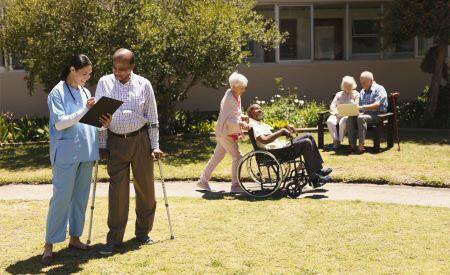
Learning To Thrive When You’re Living With A Disability
The word ‘disability’ is a very broad term that covers a wide variety of physical and mental conditions affecting people from all walks of life. The Center for Disease Control and Prevention (CDC) estimates that 61 million adults are currently living with a disability in America. That figure represents over one in four adults across the entire country.
These functional or permanent total disabilities could be either one or more of the following examples:
- Independent living - difficulty with everyday tasks such as visiting the doctor, running errands, shopping etc.
- Mobility - significant movement challenges, like climbing stairs or walking
- Hearing - moderate hearing loss or total deafness
- Cognition - difficulties with decision making, comprehension and memory
- Vision - partial or complete blindness
- Daily self-care - challenges with daily activities such as household chores, washing etc.
- Neurological disorders - conditions such as Multiple Sclerosis that can cause disability
- Head/spinal cord injuries - traumatic brain or spinal cord injuries that result in lasting mental and physical challenges
There is nothing easy about living with a disability, but there are tools and resources available to help you to come to accept your new reality and retake control of your life.
A shift in mindset 
It may sound cliche to say that the only thing we are truly in control of is our own thoughts and feelings, and sometimes it may not feel like it’s entirely accurate, but it can go a long way to overcoming your disability and thriving.
A shift in mindset can work miracles, especially when it comes to reframing how you define what success is and what overcoming your disability means to you. It doesn’t have to mean that you completely reverse it, although, if your disability is temporary then of course, you should make that your goal. Otherwise, it may be a measure of success to learn to accept it and to find ways to thrive regardless.
Is disability an obstacle to success?
Certainly, there are situations that call for a significant adaptation to your goals, but other than that, disabilities do not have to spell the end when it comes to success.
There are many famous people who have accomplished amazing things despite living with a disability. Stephen Hawking, for example, became a world-renowned theoretical physicist despite being diagnosed with a severe neurological condition at just 21 years old. Franklin D. Roosevelt became the longest-standing U.S President in history despite losing the use of both his legs as a result of having contracted polio when he was young.
These stories of defying the odds and achieving great success may be extreme but they still highlight the capacity of humans to overcome immense challenges to accomplish great things.
Coming to terms with your disability
The greatest barrier to any success is surely failure to accept what is. It is important to remember that coming to accept your disability has nothing to do with giving in to it or giving up. Quite the contrary, in fact.
By letting go of the understandable resentments and instead focusing on evaluating your situation and limitations objectively, you can then begin to discover new ways to overcome your circumstances by adapting to them in new ways. It is important to grieve first though, so don’t try and fake feelings of positivity - it’s natural to feel frustration and anger first, it’s just important to not get stuck there.
Once you’ve wrapped your head around what’s going on, you can take the next step in making decisions that are the best for you. You can start however you like, whether it be googling ”hospice near me” or even just having a more thorough look into what your options are. The point is to put yourself, and all your feelings and thoughts, first no matter what anyone says - that way, you’ll have a better chance at being genuinely happy!
Confide in a mental health professional
It can be hard to move through all of these difficult emotions on your own, and having the support and guidance of a mental health professional can make all the difference.
Unfortunately, there is still some stigma attached to seeking help for mental health, so it’s important to know that in no way is it a sign of weakness - in fact, it’s a sign of strength. It shows that you are willing to take responsibility for your wellness and find new ways to grow and learn about yourself.
Prioritize your health
There is no more important time to prioritize your health than when your well being is challenged by circumstances out of your control. Whatever exercise you can get, coupled with ensuring that you nourish your body with a healthy diet is crucial to staying as well as you can be, particularly when you are overcoming emotional and physical distress. Take the time to keep your mind sharp, make sure that you get good sleep and find ways to manage your stress, too. It’s amazing how much better equipped we are to handle adversity if we take care of our physical and mental health as best as we can.
Redefining happiness
It can take some adapting but part of learning to live well with a disability is to redefine your idea of what it is to be happy. It’s true that happiness is an inside job anyway, and largely dependent upon what we focus on. Dwelling on the unfair hand you have been dealt is completely understandable, but in no way conducive to happiness. So stay busy, practice gratitude and find new ventures that fill you with joy. It may very well seem impossible to begin with, but you can absolutely do it if you put your mind to it.